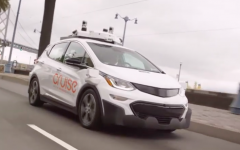
Teen studying online from home making notes. (Photo: fizkes/Shutterstock)
CPUC Set to Strip CA Residents of Subsidized Broadband Service
Denying low-income California households from combining state and federal support will only widen digital divide
By Katy Grimes, August 15, 2022 4:07 pm
The California Public Utilities Commission is looking to strip low-income California residents who participate in the California LifeLine program of subsidized broadband access next week, which is a vital resource for so many in the state.
The CPUC’s Proposed Decision will deny low-income California households from combining state and federal support (state and federal Lifeline along with the Biden/Harris signature Affordable Connectivity Program) so that they can get the most robust broadband available at no charge. A vote is scheduled for August 25, 2022.
The Globe spoke Monday with Nathan Johnson, co-founder of TruConnect (along with his twin brother Matthew), the largest Lifeline and Affordable Connectivity Program (ACP) provider within the state. Johnson said the consumer is not aware that this is up for a vote next week.
The Federal Communications Commission operates the Lifeline and ACP programs. The Lifeline program, signed into law by President Ronald Reagan in 1985, has provided a discount on phone service for qualifying low-income consumers. Johnson said following Hurricane Katrina in 2006, the George W. Bush administration expanded the FCC program to include wireless phone service, and in 2016, added standalone broadband service.
The Affordable Connectivity Program, signed into law by President Joe Biden in 2022, is an FCC benefit program that helps ensure that households can afford the Internet broadband service they need for work, school, healthcare and more.
Johnson said TruConnect provides the services beyond emergency services, to all things that can be delivered on smart phones or tablets, which is critical for low-income families with school-aged children at home, in addition to the emergency needs. AT&T explained: “the ACP gives each low-income customer $30 monthly, but the advocates’ proposal “would cut the amount in half to $15 per month, thus dramatically reducing the federal government subsidy available to support broadband services in California. In turn this would affect applicants’ ability to demonstrate the viability of proposed projects,” Communications Daily reported.
He said the CPUC’s rationale is unclear given that in every state Lifeline and the ACP are two programs that coexist well. However, the CPUC decision could hurt millions across the state and widen the digital divide – an issue Johnson says Gov. Gavin Newsom talks about frequently, but whose CPUC Commissioners treat businesses as if they are the enemy.
Nathan Johnson said TruConnect is the largest Lifeline provider and one of the largest ACP providers within California, and the impact of this proposed CPUC decision on consumers and carriers will be devastating, particularly in this current state of high inflation.
He said the CPUC allowed consumers to receive combined subsidies during the EBB program which launched in May of 2021 and continued through the end of the year when the ACP was implemented. Even though in the ACP order the FCC clearly allows subscribers to combine the ACP benefit with both state and federal Lifeline subsidies, the CPUC stopped allowing subscribers to combine subsidies January 1, 2022. In a Staff Proposal released earlier this year, the CPUC staff recommended that subscribers who were receiving wireline service should be able to combine subsidies, whereas those subscribers who were receiving wireless service should not be allowed to combine subsidies. After substantial comments questioning the legality of favoring one technology over the other, the CPUC issued the current Proposed Decision that focuses instead on the amount of subsidy being received. The Proposed Decision goes as far as to say that wireless subscribers do not need more than the 6GB of data they receive with the CA Lifeline program.
The CPUC’s independent Public Advocates Office, Center for Accessible Technology (CforAT) and The Utility Reform Network (TURN) filed comments to the Proposed Decision supporting the CPUC’s decision to dictate how California residents can apply their subsidy. They agree that California Lifeline participants do not need more than 6GBs of data per month, Communications Daily reported.
Johnson said during the pandemic, when these lower cost phone and Internet services were more crucial than ever, the CPUC refused to work with LifeLine providers to offer more service to consumers. When consumers protested, the CPUC said “if you don’t like our rules, you can get out of the market and do something else,” according to Johnson.
“‘You pay for it, provide more data, and make a lot less,'” Johnson said the CPUC told service providers. “They don’t understand how business works,” he added. “We provide a service that is badly needed for so many low-income Californians.” And then he said the CPUC came back again and said since the LifeLine and ACP providers were getting additional funding from the federal government, the CPUC was cutting state funding. “‘We think you are carriers are making too much money,'” Johnson said was the CPUC commissioners’ collective attitude.
“We are getting phone and broadband service to the most in need in California,” Johnson said. “Being ‘business friendly’ isn’t necessarily ‘consumer negative.’ We’ve invested millions in our company. But we are treated poorly because we are a private company.”
He has reached out to each of the CPUC Commissioners, as well as the governor’s office, which he said took “a kind of hands-off approach.”
“‘Do No Harm’ is out the window,” Johnson said. “They aren’t asking ‘how can we get this service to more Californians?'”
“This runs counter to everything this state stands for,” Johnson said.
He explained there is about $1 billion in the CPUC Lifeline and ACP fund right now. Gov. Gavin Newsom repurposed about $300 million of that during the pandemic for Project Homekey, but paid it back with windfall funds from the federal government, Johnson explained. “But this was at a time when people really needed more service.”
So the money is there to pay for the LifeLine and ACP service for low-income households. And, Johnson reminded us that we all contribute to the tax generated to pay for these services through our phone bills. “We are trustees of that fund,” Johnson said.
Why is the CPUC sitting on $1 billion if it is not going to spend it on the program it is legally designated for? Nathan Johnson doesn’t know given the hostile relationship the CPUC has with service providers. “Back when wireless was launched, the CPUC asked us what we needed, what they could do, and then got out of the way. We had a great relationship. Now with the new commissioners, it’s an antagonistic relationship,” Johnson said. “We can’t have any normal conversation with these people. And we’ve been doing this a long time.”
“There are some really easy solutions, with common sense,” Johnson said. “But that sucking sound… that’s California businesses leaving the state. I can deal with less of a headache in 49 other states. But we are the only Lifeline and ACP service provider based in California and we are trying to get service out despite all of this interference.”
The Globe will follow this story.
The article has been updated with additional timeline information about the CPUC’s proposed decision.
- Gov. Gavin Newsom: How to Destroy California in Two Terms - February 4, 2026
- Valero Shut Down Benicia Refinery Jan 31st – CA Gas Prices Already Climbing - February 3, 2026
- Gavin Newsom’s Claims of a Poor Childhood Conflict with Reality - February 3, 2026





Wow, thanks for covering this important story. Had no idea about it.
Let me see if I understand this correctly: Although the money is there for this program that is vital to low-income Californians, and it can be easily done, the new commissioners at the CPUC are hostile to this particular company because it has an actual business model and these new bureaucrats hate that? It’s too corporate, or something, and they want to punish them? Out of spite? And Gov Gav, who is asked to respond, stands back with his arms folded and says “not my problem?” Well, isn’t THAT interesting.
Looking forward to Chapter 2 of this story. Hope what comes from this coverage will help apply the needed pressure for CPUC to back down on its unreasonable stance, TruConnect can continue providing services, and low-income Californians can continue to receive the internet and phone services they need more than ever in these extremely difficult times.
Can’t believe a program meant to help the least fortunate is being effectively scrapped by the CPUC despite the fact that they have plenty of funding for it. Where is all that money going to go instead???
Let’s play follow the money shall we?
Another company or program with big democrat connections just might be waiting in the wings to save the day!
No surprise there. They want the poor to remain poor. Cut off their internet. Cut of their choice of quality schools. Put in pot shops to drug the poor into being stupid and lazy. It all fits the agenda.
Very true about the poor. Don’t help them in any way to succeed… they maybe a future Governor or Senator. They need to keep them in poverty.
Am I the only one who doesn’t see subsidizing “internet” for (the overly broad description of) “poor” people as a life necessity??
Public utilities should consist of water and electricity (nat gas or propane if you have access) THOSE “Public Utilities” rates should be drastically reduced by the utility companies, for “the poor”, not subsidized by taxpayer money! Public utilities are a necessity of life and should be efficient and reliable, not driven by profit for investors.
I don’t think cell phones are a “necessity” either.